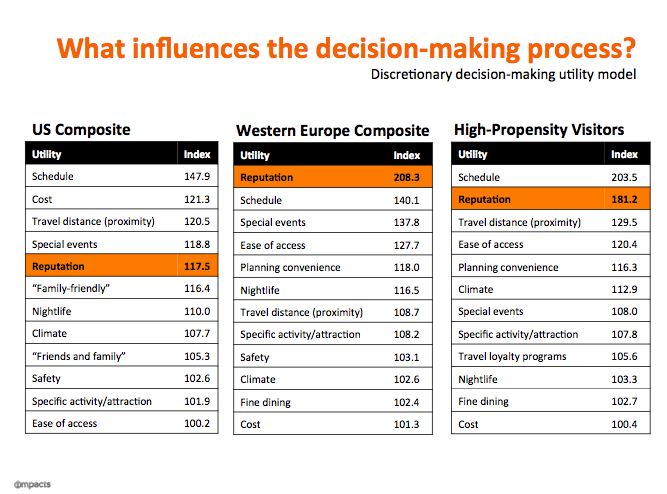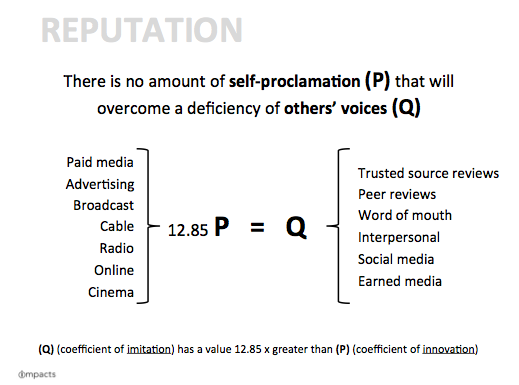
A brand for a company is like a reputation for a person. You earn reputation by trying to do hard things well. – Jeff Bezos
The reputation of an organization drives its impact and solvency. Or, is it those things that create a good reputation? Reputation is neither the cause of success, nor the outcome. It is both. It’s a chicken-and-egg issue, and that may be why some organizations tend to focus on only one side of the equation.
Organizations can – and should – keep tabs on and aim to influence their reputations in order to experience greater success in terms of both solvency and mission-impact. If your organization is like most, you don’t have a single position devoted to managing reputation…and likely think that this responsibility should rest somewhere fuzzy within the marketing department. Today, with an ever-increasing emphasis on transparency and potential supporters wanting to make their own assessments on the worthiness of organizations, an organization’s reputation plays a more important role than ever before.
Managing reputation isn’t an issue of structure, skillset, or tasking – it is an outcome of a successful workplace culture. Here are five reasons why your organization will benefit by integrating discussions concerning reputation management into its culture:
1. A good reputation shows why your organization exists (and naturally attracts people who share a passion for your mission)
“People don’t buy what you do, they buy why you do it…The goal is not to do business with everybody who needs what you have. The goal is to do business with people who believe what you believe.” –Simon Sinek
This was said by Simon Sinek during his TEDx talk on how great leaders inspire action that has been viewed over 20 million times. (It’s 18 minutes long, and is one of those inspiring, change-your-thinking videos that makes you want to send it to everyone with whom you’ve ever worked…or even marginally talked shop.)
If your organization is doing its job correctly, then the reason why staff members come to work every morning should be apparent. Your mission messaging should trump marketing as an attraction if you are a visitor-serving organization. In essence, your reputation is a reflection of your organization’s character and culture – and organizations will benefit by making sure that their reputation is strong, consistent, and, thus, without need of “hard selling.”
“If I take care of my character, my reputation will take care of me.”- Dwight L. Moody.
2. Reputation drives success (by way of donations, relationships, attendance)
A good reputation means greater odds for the long-term financial sustainability of your organization (provided that you remain true to your values and address “crisis” with expediency, sincerity, and transparency).
For visitor-serving organizations, reputation plays a particularly important role in driving visitation. Data suggest that an organization’s “reputation” is a primary motivator for visitation for high-propensity visitors (i.e. those who demonstrate the demographic, psychographic, and behavioral characteristics that indicate a heightened likelihood to visit a museum, symphony, historic site, or other visitor-serving organization). (Regular KYOB readers are likely rather familiar with the data below!) Because museums are currently suffering lower attendance as an industry, the importance of understanding this relationship is especially urgent.
A strong and stable reputation based on what you do best plays a logical role in building stronger relationships with other organizations, sponsors, politicos, and supporters.
3. Reputation conversation necessitates acknowledgement of the importance of online engagement
What makes up an organization’s reputation? Good question. Regular KYOB readers know that I talk about this…a lot. The answer is a little bit paid media (e.g. advertising) and a lot bit of reviews from trusted sources (particularly word of mouth and earned media – both of which are often facilitated by social media). In fact, reviews from trusted resources are 12.85 times more influential in terms of your organization’s reputation than is the advertising that comes out of a media budget.
Because real-time, online platforms play such a critical role in both cultivating and maintaining reputation, it is nearly impossible to intelligently discuss reputation without also contemplating (online and offline) engagement strategies. It means that organizations will need to talk about social media as it relates to organizational goals and the behavior of breathing human beings instead of reducing the conversation to “likes” and technological skillsets…and that’s a good, necessary thing.
4. Understanding your reputation requires understanding your audience (another best practice increasingly necessary for success)
In order to understand the strength of an organization’s reputation, that organization actually needs to listen to people outside of the organization. No, a person inside of the organization cannot determine current reputation. Create an image and build a culture to create a desired reputation? Sure. But nobody in the organization can talk about the organization’s reputation without first listening to feedback from your audiences. Only your market can lend insight into current perceptions of your organization.
Paying attention to the market is critical and it’s one of the main reasons why marketing has evolved from a service department to a strategy-oriented department.
5. Reputation management falls to everybody (because it falls to nobody)
Most organizations do not have a Chief Reputation Officer (aside from, perhaps, an overworked CEO), but there is budding conversation about why some organizations may want to consider it.
Reputation management is fundamentally different than a role that might be found within a marketing and communications department. It involves strategically managing and monitoring relationships with distinct constituent groups – including groups related to development, visitor services, community outreach, and government relations functions.
Even if an organization does appoint a committee or a position related to reputation management, we live in a time when not having the whole organization on board with your vision (or your “why” – see point #1) can lead to a fragmented reputation. Today, Benjamin Franklin’s words have never been truer: “It takes many good deeds to build a reputation and only one bad one to lose it.”
In sum, an organization’s reputation is one of its most valuable assets, and, as such, it’s time we start actively talking about it within every department.
We would all like a reputation for generosity and we’d all like to buy it cheap.
–Mignon McLaughlin



